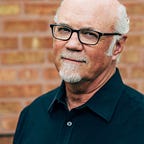In My Dreams
When the story comes together through your subconscious mind
For as long as I can remember, my dreams have been vivid, odd, strange, at times wildly unnerving, and at other times unexpectedly euphoric. Nearly all are in color. Like many of us, people in my life show up. Some alive, some dead. Even pets. I can be prone to anxiety dreams. One recurring dream is about my days in the radio industry. I’m in a studio and nothing works — the microphone won’t turn on, the computers are malfunctioning, the studio clock is spinning wildly out of control. That’s just one of my many anxious dreams. But I’ve also experienced joy that has never been matched in real life, otherworldly joy. Unexplainable joy. And there is one dream that I will never forget.
I awoke in a state of overwhelming euphoria. I could not stop smiling. I even began to laugh uncontrollably. My heart and soul were alive like they never had been. The dream centered around an uncanny ability to simply wave my arm and hand and produce magnificently vibrant scenes. In the dream, I was able to summon a full flower garden that Peter Max, the psychedelic painter of the 1960s, would have loved to call his own. Think “Lucy in the Sky with Diamonds.” All I had to do was wave my arm and the full spectrum arose out of nothing. Over and over, I did this. And when I awoke, I was the happiest I had ever been in my life. No hyperbole. Yes, it seems strange to say that. But it was so intense, to this day I remember it exactly and remain in awe over the experience.
I write this as I am once again considering dreams and the part they might play in my life. This began after I started reading a Jack Kerouac book I had not read before.
Book of Dreams is a journal in many ways. Published in 1961 at the height of Kerouac’s fame from On the Road, the book is a more than decades-long catalog of many of the author’s dreams. It is said that he awoke each morning and immediately documented his dreams from the night, each recollection in his signature spontaneous style — jazz-like, unconcerned with grammar, syntax, structure, or traditional narrative. The book is not for everyone. Kerouac fans can see where characters from his books might have been formed. Readers recognize the contemporaries in his life — Ginsberg and others. Like most dreams, much of the recollections are wild, even absurd, hard to follow, disjointed, and many times so odd that you wonder if anyone is capable of these kinds of dreams. But that’s what dreaming is, and in a way, that’s Kerouac.
About halfway through the book, it became clear to me how important dreams, and my dream life, have been to my creative life, and the evidence was recent.
There is plenty of documentation on how creators and artists have used their dreams to produce work. Mary Shelley is said to have discovered the two major scenes in Frankenstein in a dream. Robert Louis Stevenson dreamt nearly the entire story of Dr. Jekyll and Mr. Hyde. Paul McCartney has said that his song “Yesterday” came to him in a dream…the melody fully formed in his head. He thought maybe he had heard the tune somewhere else before and that it had simply manifested itself in his dream. But after playing the melody for others, he realized that the song was the dream. It had come from his deep subconscious.
Research has shown that the physiological demands of sleep change the way the brain works, that sleep is essentially a different biochemical state of being. This strange level of consciousness can then be a problem solver, helping to find answers to questions we could not have imagined in our awakened state, our “normal” lives, even questions we didn’t know we had and answers we couldn’t believe we were capable of discovering.
Over the last few months, I have awakened with revelations about stories I’m writing, with clarity about structure, details of a character, themes. I once awakened immediately knowing I had to change the name of a story’s character. My dream had told me the name change was necessary. My dream was right. It gave the story another level. I’m not sure I would have come to that realization in an awakened state. And just a few weeks ago, an entire story was there when I awoke. The structure, the storyline, all laid out. All the details, dialogue, and certain elements, no, but the outline was there, the theme was glaringly obvious. Not long after that, a line for a poem flashed in a dream. When I awoke, I remembered it and wrote it down. It ended up in a poem that was accepted for publication.
I don’t remember my dreams being this connected to my creative life some five, ten, or even twenty years ago. This is a recent discovery, it seems. But I wonder, too, if my sleeping state and my creative life have always been tethered and that it took Kerouac’s dreams to help me see it.
David W. Berner is an award-winning author of fiction and memoir. He writes regular essays at The Abundance and teaches memoir and fiction classes at Gotham Writers, NYC.
